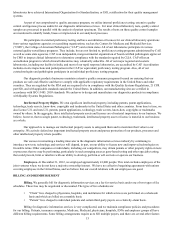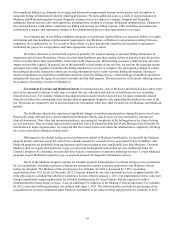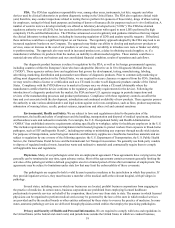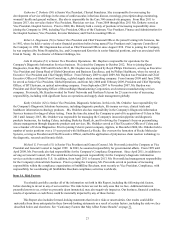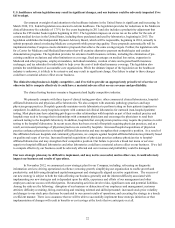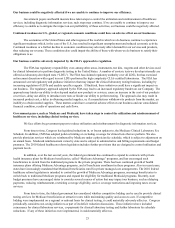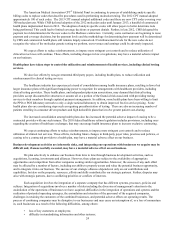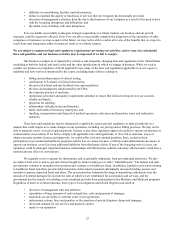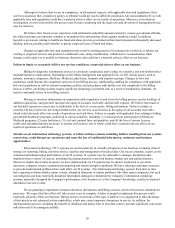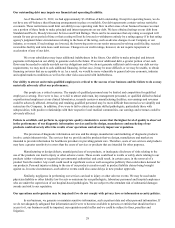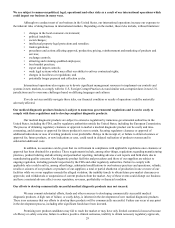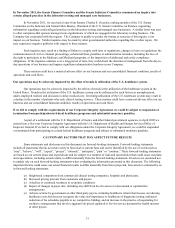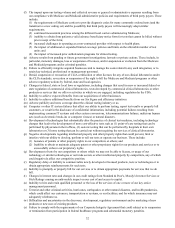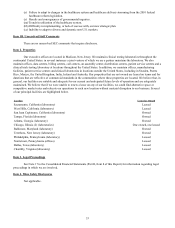Quest Diagnostics 2012 Annual Report Download - page 26
Download and view the complete annual report
Please find page 26 of the 2012 Quest Diagnostics annual report below. You can navigate through the pages in the report by either clicking on the pages listed below, or by using the keyword search tool below to find specific information within the annual report.23
Our business could be negatively affected if we are unable to continue to improve our efficiency.
Government payers and health insurers have taken steps to control the utilization and reimbursement of healthcare
services, including diagnostic information services; such steps may continue. If we are unable to continue to improve our
efficiency to enable us to mitigate the impact on our profitability of these activities, our business could be negatively affected.
Continued weakness in U.S., global, or regional economic conditions could have an adverse effect on our businesses.
The economies of the United States and other regions of the world in which we do business continue to experience
significant weakness which, in the case of the U.S., has resulted in significant unemployment and reduced economic activity.
Continued weakness or a further decline in economic conditions may adversely affect demand for our services and products,
thus reducing our revenue. These conditions also could impair the ability of those with whom we do business to satisfy their
obligations to us.
Our business could be adversely impacted by the FDA's approach to regulation.
The FDA has regulatory responsibility over, among other areas, instruments, test kits, reagents and other devices used
by clinical laboratories to perform diagnostic testing in the United States. A number of esoteric tests we develop internally are
offered as laboratory-developed tests (“LDTs”). The FDA has claimed regulatory authority over all LDTs, but has exercised
enforcement discretion with regard to most LDTs performed by high complexity CLIA-certified laboratories. The FDA has
announced several regulatory and guidance initiatives that may impact the clinical laboratory testing business, including by
increasing regulation of LDTs and analyte specific reagents. If finalized, these initiatives could have a significant impact on
our business. The regulatory approach adopted by the FDA may lead to an increased regulatory burden on our Company. The
approach may hinder our ability to develop and market new products or services, cause an increase in the cost of our products
or services, delay our ability to introduce new tests or hinder our ability to perform testing. The approach also may result in
increased product cost, a delay in obtaining needed supplies, or, if a manufacturer withdraws its products from the market, an
inability to obtain needed supplies. These matters could have a material adverse effect on our business and our consolidated
financial condition, results of operations and cash flows.
Government payers, such as Medicare and Medicaid, have taken steps to control the utilization and reimbursement of
healthcare services, including clinical testing services.
We face efforts by government payers to reduce utilization and reimbursement for diagnostic information services.
From time to time, Congress has legislated reductions in, or frozen updates to, the Medicare Clinical Laboratory Fee
Schedule. In addition, CMS has adopted policies limiting or excluding coverage for clinical tests that we perform. We also
provide physician services which are reimbursed by Medicare under a physician fee schedule, which is subject to adjustment on
an annual basis. Medicaid reimbursement varies by state and is subject to administrative and billing requirements and budget
pressures. The 2010 federal healthcare reform legislation includes further provisions that are designed to control utilization and
payment levels.
In addition, over the last several years, the federal government has continued to expand its contracts with private
health insurance plans for Medicare beneficiaries, called “Medicare Advantage” programs, and has encouraged such
beneficiaries to switch from the traditional programs to the private programs. There has been continued growth of health
insurance plans offering Medicare Advantage programs, and of beneficiary enrollment in these programs. Also in recent years,
states have increasingly mandated that Medicaid beneficiaries enroll in private managed care arrangements. The 2010 federal
healthcare reform legislation is intended to control the growth of Medicare Advantage programs, encourage beneficiaries to
switch back to traditional Medicare programs and expand the eligibility for traditional Medicaid programs. Recently, state
budget pressures have encouraged states to consider several courses of action that may impact our business, such as delaying
payments, reducing reimbursement, restricting coverage eligibility, service coverage restrictions and imposing taxes on our
services.
From time to time, the federal government has considered whether competitive bidding can be used to provide clinical
testing services for Medicare beneficiaries at attractive rates while maintaining quality and access to care. If competitive
bidding were implemented on a regional or national basis for clinical testing, it could materially adversely affect us. Congress
periodically considers cost-saving initiatives as part of its deficit reduction discussions. These initiatives have included
coinsurance for clinical laboratory services, co-payments for clinical laboratory testing and further laboratory fee schedule
reductions. If any of these initiatives were implemented, it could materially affect us.




